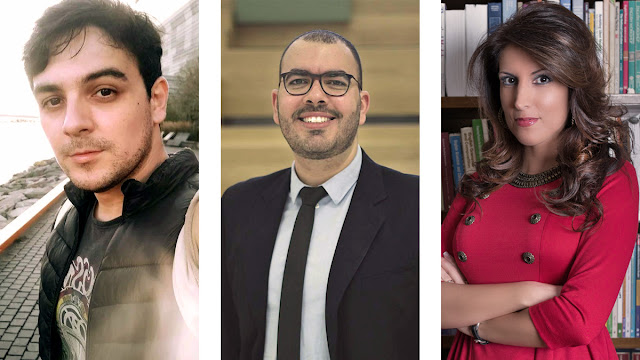 |
| From left: Amurabi Oliveira, Raul Oliveira Albuquerque Paraná and María Luisa Pérez-Cañado. |
By Michael Klitzing
Three international scholars in the field of education will bring their expertise, perspectives and research to the College of Education in Spring 2022 as part of San Diego State University’s Visiting Scholars Program.
COE will host Amurabi Oliveira, a professor in the Department of Sociology and Political Science at the Federal University of Santa Catarina in Brazil, from Jan. 3 through April 30. María Luisa Pérez-Cañado, a professor in the Department of English Philology at the University of Jáen in Spain, and Raul Oliveira Albuquerque Paraná, a language education consultant and language teacher in Brazil, will visit SDSU April 10-24.
“Let me be the first to welcome these dynamic thought leaders to the SDSU campus and into our College of Education community,” said Y. Barry Chung, dean of the College of Education. “I hope our faculty and students take full advantage of this unique opportunity to gain a truly global perspective on the education field and discover new avenues for collaboration.”
Added Cristian Aquino-Sterling, associate dean for diversity and international affairs: “The presence of visiting international scholars in the SDSU College of Education reflects our commitment to continue to engage and to learn with and from the world beyond our borders. These scholarly collaborations are pivotal for helping us see our work anew, and for enlivening and enriching our perspectives so that we can continue to serve our respective local communities and our greater world, in ever more relevant and meaningful ways.”
Amurabi Oliveira
A former high school teacher and teacher educator, Oliveira now studies the recent rise of populism and authoritarianism and their impact on how educators teach social science in schools. He recently traveled to Poland to study the phenomenon.
“Many similar things have happened in both Brazil and the U.S. over the past five or six years,” Oliveira said. “One thing that got my attention was the creation of the post-truth era and its impact on the teaching of not only social science but also teaching in general. I want to understand that better."
Last year, Oliveira concluded a year as a visiting professor in Spain. As a Fulbright scholar at SDSU, collaborating with faculty-sponsor and School of Teacher Education professor emeritus Ronald Evans — a leading expert on social studies and curriculum history — Oliveira is particularly looking forward to conducting field work in San Diego-area schools, talking to social studies teachers about their experiences.
His visit is being co-sponsored by SDSU’s Behner Stiefel Center for Brazilian Studies.
“I’ve never been to the U.S. before — not even as a tourist,” Oliveira said. “I’m really interested in exploring the academic culture in a country with such long-term experience in democracy. That's very different than what we have in Brazil. To me it's incredible to find out the meaning of academic freedom in a country with so deep a democratic experience.”
María Luisa Pérez-Cañado
Pérez-Cañado is a leading international scholar in bilingual education and Content Language Integrated Language (CLIL), an educational approach in which students learn a language and a subject simultaneously. She is currently conducting research across six European countries to identify difficulties, best practices and training that will help facilitate diversity-sensitive teaching and learning in bilingual programs.
“Carrying out a research stay at SDSU will undoubtedly help us advance on all these fronts because you’re doing outstanding work in this area,” Pérez-Cañado said. “We have a great deal to learn here in Europe from how you’re dealing with the whole issue of diversity/inclusion differentiation/integration in bilingual programs in the U.S.”
Pérez-Cañado said she is particularly excited to meet faculty and students from SDSU’s Department of Dual Language and English Learner Education, observe classes and explore opportunities for collaboration. She also intends to visit San Diego-area dual language schools to observe best practices.
This visit is something of a do-over for Pérez-Cañado, who was an International Visiting Scholar at SDSU when the pandemic hit in early 2020, causing her to return to Spain early.
“I truly look forward to having the chance to undertake all the activities which COVID precluded me from doing,” she added. “I’m excited at the prospect of exploring future avenues for collaboration between our universities, projects and masters degrees.”
Raul Oliveira Albuquerque Paraná
Paraná is an expert on CLIL. He is currently working with the University of Jaén and the Federal University of Bahia in Brazil to develop an online CLIL program for Brazilian teachers.
“Given Dr. Cristian Aquino-Sterling's and Dr. María Luisa Pérez Cañado's great expertise in both multilingual education and research methods, it is my hope that together we can work on analyzing some of the data that has been collected during the pilot course offered in 2020,” Paraná said. “Maybe SDSU could also be involved in this program in some capacity? One can dream!”
Paraná, who had to postpone an earlier visit to SDSU because of the pandemic, is visiting thanks to support from the Behner Stiefel Center for Brazilian Studies´ Research Grant Program. He said he is particularly excited to learn how multilingual teacher education is conducted at SDSU and connect with faculty members interested in bilingual/dual-language education, remote learning and teacher education.
“It would be most wonderful to have opportunities to hear from faculty, teachers, and student-teachers about their experiences during the pandemic, as well as to share about our experiences here,” he said.
